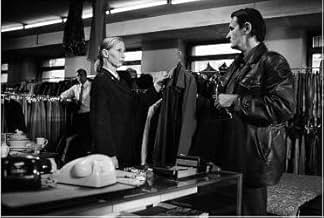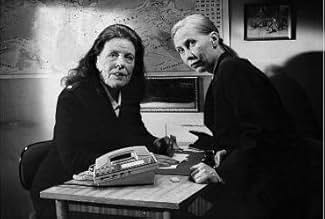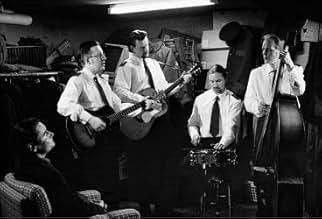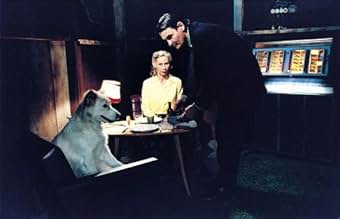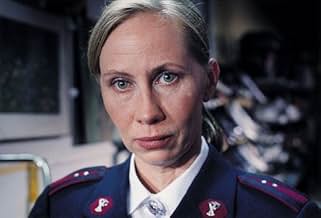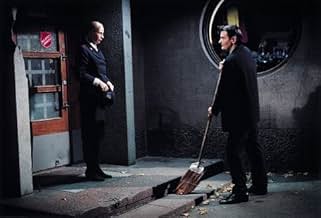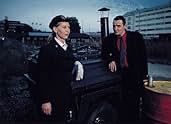PUNTUACIÓN EN IMDb
7,6/10
28 mil
TU PUNTUACIÓN
M llega a Helsinki y es brutalmente atacado por matones y declarado muerto por los médicos. Revive pero sin recuerdos de su pasado ni de su identidad. Reconstruye su vida desde cero, pero el... Leer todoM llega a Helsinki y es brutalmente atacado por matones y declarado muerto por los médicos. Revive pero sin recuerdos de su pasado ni de su identidad. Reconstruye su vida desde cero, pero el pasado acaba alcanzándole.M llega a Helsinki y es brutalmente atacado por matones y declarado muerto por los médicos. Revive pero sin recuerdos de su pasado ni de su identidad. Reconstruye su vida desde cero, pero el pasado acaba alcanzándole.
- Nominado para 1 premio Óscar
- 21 premios y 27 nominaciones en total
Reseñas destacadas
I am not familiar at all with the work of this director at all so I was unsure what to expect from this movie when seeing it as part of the Regus London Film Festival on tour.
I needn't have worried. This film is very touching and in many places laugh out loud funny. The scene where the dog is introduced is just side-splitting.
The humour is so dry and it is very hard to compare this film with many other films, but for some reason it reminded me a little of Jean-Pierre Jeunet's Delicatessen, especially some of the colours in the set design.
I understand this film is the second part of a trilogy? I simply have to see more stuff from this guy, I feel like I have missed out in a big, big way!
If you get the chance, don't hesitate to see this film, it is simply a work of art. I for one will be going to see it again when it goes on general release next year.
I needn't have worried. This film is very touching and in many places laugh out loud funny. The scene where the dog is introduced is just side-splitting.
The humour is so dry and it is very hard to compare this film with many other films, but for some reason it reminded me a little of Jean-Pierre Jeunet's Delicatessen, especially some of the colours in the set design.
I understand this film is the second part of a trilogy? I simply have to see more stuff from this guy, I feel like I have missed out in a big, big way!
If you get the chance, don't hesitate to see this film, it is simply a work of art. I for one will be going to see it again when it goes on general release next year.
I've watched this twice now, and throughly enjoyed both viewings, finding this film to really be a unique one. It's a Finnish film, which is unusual to start with, at least here in the U.S. because we don't see too many films from Finland. It's a black comedy, meaning deadpan looks with subtle comedic lines. In English, it's titled "The Man Without A Past."
The main actor, Markuu Peltola, is perfect for this movie with one of the most deadpan faces you'll ever see. He is amazing to watch and Kati Outinen, as his love interest, is similarly strange and fascinating. Part of their charm are their unusual looks. This is not a romance between people who look like your normal handsome film stars.
Simply, this is just something very different from anything you've seen, a combination of drama, comedy and romance with some of the strangest dialog I've ever heard on film. If you appreciate dry humor and a bizarre but touching story, you should see this.
The main actor, Markuu Peltola, is perfect for this movie with one of the most deadpan faces you'll ever see. He is amazing to watch and Kati Outinen, as his love interest, is similarly strange and fascinating. Part of their charm are their unusual looks. This is not a romance between people who look like your normal handsome film stars.
Simply, this is just something very different from anything you've seen, a combination of drama, comedy and romance with some of the strangest dialog I've ever heard on film. If you appreciate dry humor and a bizarre but touching story, you should see this.
This movie is deceptive--a casual viewing could discard it as another "feel good" film from Europe.
It permeates Christian values without sermons, priests, or any religious hard sell (a small poster of Christ in a booth of the Salvation Army is an exception). Philosophically, it presents Tabula Rasa or a clean slate to begin life anew. The film tends to be absurdist (not even a moan emanates from brutalized victims of violence, broken noses are twisted back painlessly, victims of violence emerge from shadows to mete out justice). The film recalls shades of the brilliance of Tomas Alea's early Cuban films and the humanity of Zoltan Fabri's Hungarian cinema.
The film presents entertainment of a kind that would be alien to Hollywood--a cinematic essay on human values that seem to be a rare commodity the world over. There is no sex; there is no need for it. The poor who live in garbage bins and in empty containers, are rich with pockets full of kindness, helping each other without any expectation of a reward. The rich and powerful (the ex-wife and her lover, the policemen, the hospital staff, the official who rents out illegal living space) seem bereft of true feelings or any human kindness. The poorer sections of society (the electrician, the restaurant staff, the family who nurses the main character, the Salvation Army staff) do good to others, care about others and expect nothing in return.
The film is an affirmation of Christian values without preaching religion. The main female character in love with the man, is ready to sacrifice her love because she genuinely respects marriage vows and even brings a "train" schedule to send off her lover to his wife. The art of giving is sanctified. A man who employed workers believes in paying his workers, even if it meant robbing a bank to do so. A lawyer argues a case well because he likes the Salvation Army. Symbolically, even half a potato among six or eight harvested is given away to some stranger wanting to eat it and avoid scurvy! Again, symbolically there is rain on a clear day to help grow the few potatoes...
The film provides humour of a quaint, Finnish variety. A timid dog that eats leftover peas is called Hannibal--a male name one can associate with a king or even the cannibalistic Hannibal Lecter--even though the dog is female. There are swipes taken against the government and its associated machinery (antiquated laws, North Korean buying Finnish banks, retirement benefits, strikes and strikers, bank staff, corrupt banking practices).
Trains play a crucial role in Kaurismaki's screenplay. It begins and ends the film. It also punctuates the film, when the past is revealed, briefly.
There are possible flaws in the film--the blue tint when the children spot the injured man. The unexplained Japanese dinner with Sake and Japanese music on the train. The significance of the cigar in the script is elusive. The choice of songs, however good, seem to be haphazard.
The script is otherwise brilliant. In glorifying the detritus of society, Kaurismaki seems to affirm there is indeed a link between the tree and falling dead leaf (with reference to a comment by a character in the movie). The train moves on. Forward, not backwards!
Minimizing the world into a man, a woman, a dog and trains, Kaurismaki serves a feast of observations for a sensitive mind--a tale told with a positive approach to move on and seize the day. It is a political film, an avant garde film, a comedy and a religious film, all lovingly bundled together by a marvelous cast.
Finland should thank Kaurismaki--he is her best ambassador. He makes the viewer love the Finns, warts and all!
It permeates Christian values without sermons, priests, or any religious hard sell (a small poster of Christ in a booth of the Salvation Army is an exception). Philosophically, it presents Tabula Rasa or a clean slate to begin life anew. The film tends to be absurdist (not even a moan emanates from brutalized victims of violence, broken noses are twisted back painlessly, victims of violence emerge from shadows to mete out justice). The film recalls shades of the brilliance of Tomas Alea's early Cuban films and the humanity of Zoltan Fabri's Hungarian cinema.
The film presents entertainment of a kind that would be alien to Hollywood--a cinematic essay on human values that seem to be a rare commodity the world over. There is no sex; there is no need for it. The poor who live in garbage bins and in empty containers, are rich with pockets full of kindness, helping each other without any expectation of a reward. The rich and powerful (the ex-wife and her lover, the policemen, the hospital staff, the official who rents out illegal living space) seem bereft of true feelings or any human kindness. The poorer sections of society (the electrician, the restaurant staff, the family who nurses the main character, the Salvation Army staff) do good to others, care about others and expect nothing in return.
The film is an affirmation of Christian values without preaching religion. The main female character in love with the man, is ready to sacrifice her love because she genuinely respects marriage vows and even brings a "train" schedule to send off her lover to his wife. The art of giving is sanctified. A man who employed workers believes in paying his workers, even if it meant robbing a bank to do so. A lawyer argues a case well because he likes the Salvation Army. Symbolically, even half a potato among six or eight harvested is given away to some stranger wanting to eat it and avoid scurvy! Again, symbolically there is rain on a clear day to help grow the few potatoes...
The film provides humour of a quaint, Finnish variety. A timid dog that eats leftover peas is called Hannibal--a male name one can associate with a king or even the cannibalistic Hannibal Lecter--even though the dog is female. There are swipes taken against the government and its associated machinery (antiquated laws, North Korean buying Finnish banks, retirement benefits, strikes and strikers, bank staff, corrupt banking practices).
Trains play a crucial role in Kaurismaki's screenplay. It begins and ends the film. It also punctuates the film, when the past is revealed, briefly.
There are possible flaws in the film--the blue tint when the children spot the injured man. The unexplained Japanese dinner with Sake and Japanese music on the train. The significance of the cigar in the script is elusive. The choice of songs, however good, seem to be haphazard.
The script is otherwise brilliant. In glorifying the detritus of society, Kaurismaki seems to affirm there is indeed a link between the tree and falling dead leaf (with reference to a comment by a character in the movie). The train moves on. Forward, not backwards!
Minimizing the world into a man, a woman, a dog and trains, Kaurismaki serves a feast of observations for a sensitive mind--a tale told with a positive approach to move on and seize the day. It is a political film, an avant garde film, a comedy and a religious film, all lovingly bundled together by a marvelous cast.
Finland should thank Kaurismaki--he is her best ambassador. He makes the viewer love the Finns, warts and all!
10a2859289
Whoever has seen any of Aki Kaurismäki's films might agree that they are all but mainstream. Nevertheless, the story itself doesn't have to be too complicated. In this case, a man completely loses his past in a shockingly violent way, and he rediscovers life again in an environment of bums who sleep in containers. The good thing I found about this movie was: No romanticism of misery, no enlightenment of the tortured hero, no sob-stuff love story, no superfluous, aloof intellectualism at all. At least not in an obtrusive or overly serious way. But in a way that it sometimes shocked me , sometimes made me laugh, sometimes grin. I was never bored. And as I made it to Finland for the first time in my life a few weeks after seeing this movie - I found everything to be amazingly authentic.
A remarkable film that definitely moves into my shrine of the best 50!
A remarkable film that definitely moves into my shrine of the best 50!
Herzog introduced me to the tension created by moving back and forth from highly styled scenes to realistic ones in syncopated steps. It has an extraordinary effect; I do not know who first devised this technique, but it matters.
Sometimes, you will see it adding value on the real side. Rarely is it ever used this way, to multiply anchor a minimalist sketch of fate. Jarmusch does this, perhaps being the master, but this is pretty clean, novel and effective as well. Its because Fins are inherently minimalist in a particularly overt way. Stylized in a stylized way, perhaps to stand above its neighbors who value cleanliness but only after passing through terminal sophistication.
There is a sweet purity to this man we see, and the man we do not who made the thing. There is an honor in just getting up in the morning. The people here are either honest and generous — even the local cop who exploits the poor — or crippled participants in the machine. Everyone with a conventional job is in this latter class.
Just as with most Jarmusch, music and the enrichment it brings, is woven into the story as an intrinsic element. The music itself is highly stylized, and like the film is an abstraction of deep, rich emotion. It is played here by a Slavation Army band our hero brings to musical salvation. The love story matters I think, because it depends on nothing other than simple need and directness.
Ted's Evaluation -- 3 of 3: Worth watching.
Sometimes, you will see it adding value on the real side. Rarely is it ever used this way, to multiply anchor a minimalist sketch of fate. Jarmusch does this, perhaps being the master, but this is pretty clean, novel and effective as well. Its because Fins are inherently minimalist in a particularly overt way. Stylized in a stylized way, perhaps to stand above its neighbors who value cleanliness but only after passing through terminal sophistication.
There is a sweet purity to this man we see, and the man we do not who made the thing. There is an honor in just getting up in the morning. The people here are either honest and generous — even the local cop who exploits the poor — or crippled participants in the machine. Everyone with a conventional job is in this latter class.
Just as with most Jarmusch, music and the enrichment it brings, is woven into the story as an intrinsic element. The music itself is highly stylized, and like the film is an abstraction of deep, rich emotion. It is played here by a Slavation Army band our hero brings to musical salvation. The love story matters I think, because it depends on nothing other than simple need and directness.
Ted's Evaluation -- 3 of 3: Worth watching.
¿Sabías que...?
- CuriosidadesIn the bar scene there is a portrait photo of Matti Pellonpää on the wall. He played in numerous Kaurismäki films before his sudden death in 1995.
- PifiasThe Helsinki railway station's extension roof is clearly visible at the opening scene, but it hadn't been built yet in 1996 (the year can be read from the newspaper).
- ConexionesFeatured in Matka suomalaiseen elokuvaan: Naurua pimeässä (2006)
- Banda sonoraDo The Shake
Performed by The Renegades
Music & Lyrics by Brown / Gibson / Johnson / Mallett
Published by Warner / Chappell Music Finland
(P) 1964 Scandia / Warner Music Finland
Licensed courtesy of Warner Music Finland
Selecciones populares
Inicia sesión para calificar y añadir a tu lista para recibir recomendaciones personalizadas
- How long is The Man Without a Past?Con tecnología de Alexa
Detalles
- Fecha de lanzamiento
- Países de origen
- Sitios oficiales
- Idioma
- Títulos en diferentes países
- The Man Without a Past
- Localizaciones del rodaje
- Empresas productoras
- Ver más compañías en los créditos en IMDbPro
Taquilla
- Presupuesto
- 8.000.000 FIM (estimación)
- Recaudación en Estados Unidos y Canadá
- 921.847 US$
- Fin de semana de estreno en EE. UU. y Canadá
- 23.281 US$
- 6 abr 2003
- Recaudación en todo el mundo
- 9.564.237 US$
- Duración
- 1h 37min(97 min)
- Color
- Mezcla de sonido
- Relación de aspecto
- 1.85 : 1
Contribuir a esta página
Sugerir un cambio o añadir el contenido que falta






